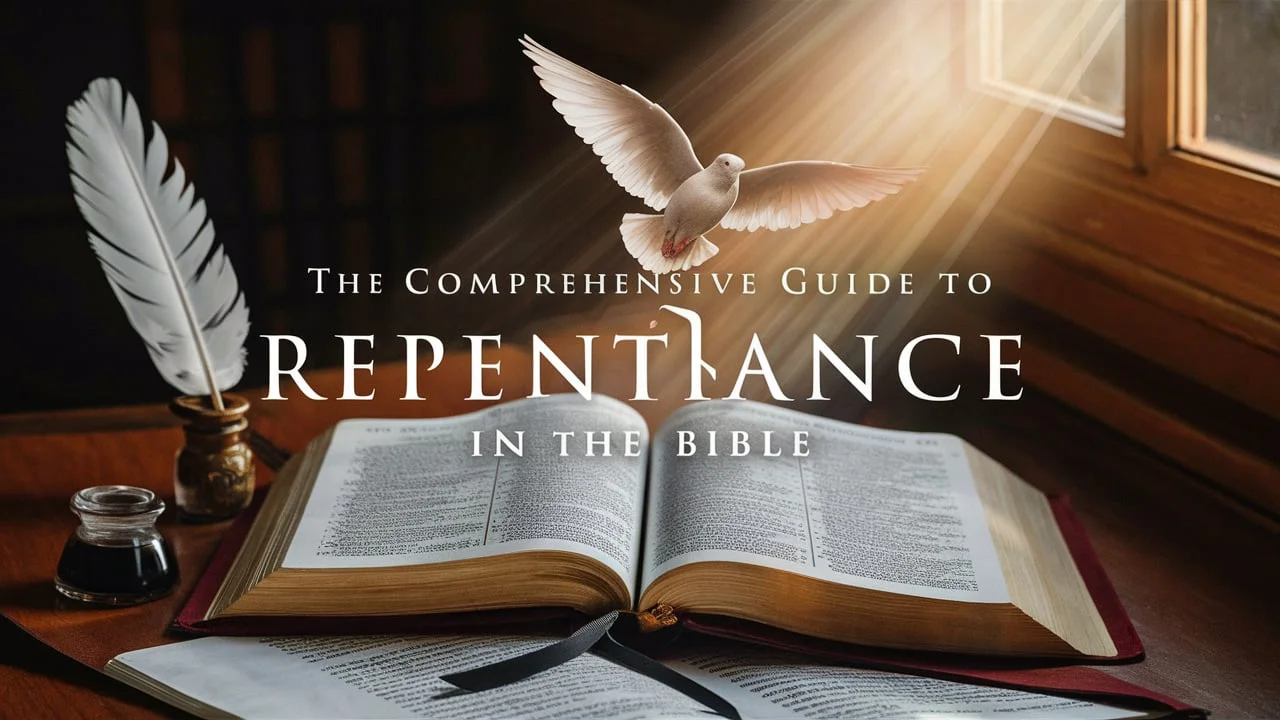Last Updated on September 5, 2024 by Muhammad Ramzan
Repentance is a cornerstone of biblical faith, deeply woven into the fabric of both Old and New Testament teachings. This guide explores repentance from its foundational definitions to its transformative power, offering insights into how this concept impacts spiritual life today.
Understanding Repentance: A Biblical Definition
Repentance in the Bible goes beyond mere regret. The term is derived from the Hebrew word “shuv” and the Greek word “metanoia”.
- “Shuv” means “to turn back” or “return” and implies a physical turning away from sin.
- “Metanoia” combines “meta” (change) and “noia” (mind), signifying a complete change of heart and mind.
Biblically, repentance involves a deep, transformative shift in how one thinks and behaves. It’s not just about feeling sorry but actively changing one’s direction in life. This transformation is essential for aligning with God’s will and experiencing His forgiveness.
The Old Testament Perspective on Repentance
Key Concepts
In the Old Testament, repentance often involves returning to God and forsaking sin. It reflects a communal and individual process of reconciliation with God.
Prophetic Call to Repentance
Prophets like Isaiah, Jeremiah, and Ezekiel played crucial roles in calling Israel to repentance:
- Isaiah urged Israel to “cease to do evil” (Isaiah 1:16) and “learn to do good” (Isaiah 1:17), emphasizing moral and social justice.
- Jeremiah highlighted the need for a “new heart” and “new spirit” (Jeremiah 31:33) as part of true repentance.
- Ezekiel spoke of God giving a “new heart” and “new spirit” to those who repent (Ezekiel 36:26).
These calls to repentance involved both individual change and a collective return to righteousness.
Repentance Practices
In ancient Israel, repentance was often accompanied by rituals like fasting, sackcloth, and ashes. These outward signs symbolized inner sorrow and a commitment to change.
The New Testament Perspective on Repentance
Evolution of Understanding
The New Testament builds on Old Testament ideas but emphasizes personal relationship with Jesus Christ. Repentance in the New Testament focuses more on inner transformation and less on ritualistic practices.
Jesus’ Teachings
Jesus’ approach to repentance is both radical and profound. He preached that repentance involves a change of heart and acceptance of the Gospel. Key teachings include:
- “Repent, for the kingdom of heaven has come near” (Matthew 4:17).
- “Unless you repent, you too will all perish” (Luke 13:3).
These teachings call for a profound personal transformation and an invitation to enter God’s kingdom.
Apostolic Teachings
The apostles further developed the concept of repentance. For instance:
- Paul emphasized the importance of repentance in his letters, urging believers to “turn to God in repentance” (Acts 20:21).
- Peter called for repentance and baptism as a response to the Gospel (Acts 2:38).
Their teachings reinforced that repentance is central to the Christian experience.
The Call to Repentance in the New Testament
Jesus’ Call
Jesus frequently invited individuals to repent and follow Him. His encounters often involved:
- Personal Conviction: Such as in the case of the woman caught in adultery (John 8:11), where Jesus said, “Go now and leave your life of sin”.
- Public Calls: Jesus used parables like the Prodigal Son (Luke 15:11-32) to illustrate God’s joy over one sinner who repents.
Early Church Messages
The early church continued to emphasize repentance in its preaching:
- Peter’s Pentecost sermon called for “repentance and baptism” (Acts 2:38).
- Paul wrote to the churches urging them to maintain a lifestyle of repentance and faith.
The Transformative Power of Repentance
Personal Change
Repentance is transformative. It leads to:
- Spiritual Renewal: A fresh start with God, where past sins are forgiven and a new path is set.
- Behavioral Change: A shift away from sinful behaviors and towards a life reflecting God’s righteousness.
Community Impact
Repentance also affects communities:
- Restoration: When individuals repent, it can lead to healing and unity within the church.
- Witness: A repentant life serves as a powerful testimony to others about the grace and power of God.
The Elements of True Repentance
True repentance involves several key elements:
- Contrition: Genuine sorrow for sin. This is not just feeling guilty but deeply regretting the actions that have separated one from God.
- Confession: Acknowledging one’s sins openly. As 1 John 1:9 says, “If we confess our sins, he is faithful and just to forgive us our sins”.
- Restitution: Making amends where possible. This involves correcting wrongs and seeking reconciliation.
- Change of Heart: A true change involves a shift in desires and actions. It’s about pursuing a new way of life.
Repentance and Forgiveness in the Bible
Interconnection
Repentance and forgiveness are intricately linked. Biblical forgiveness is offered in response to sincere repentance:
- God’s Forgiveness: In the Old Testament, God promised forgiveness to those who truly repented (e.g., 2 Chronicles 7:14).
- Forgiving Others: Jesus taught that we should forgive others as God forgives us (Matthew 6:14-15).
Divine Forgiveness
God’s forgiveness is profound and complete:
- Unconditional Love: God’s willingness to forgive is a testament to His boundless love and grace.
- Restoration: Forgiveness through repentance restores one’s relationship with God.
Biblical Examples of Repentance
King David’s Repentance
King David’s repentance is a powerful example of heartfelt contrition:
- Context: David’s adultery with Bathsheba and the murder of Uriah (2 Samuel 11).
- Psalm 51: David’s repentance is expressed in this Psalm, where he says, “Create in me a pure heart, O God” (Psalm 51:10).
David’s repentance was genuine, involving sorrow, confession, and a plea for renewal.
The Prodigal Son
The parable of the Prodigal Son illustrates the joy of repentance:
- Story Overview: The son squanders his inheritance and returns home, expecting rejection but receiving a warm welcome (Luke 15:11-32).
- Application: This story highlights God’s readiness to forgive and the transformative power of repentance.
The Repentance of Zacchaeus
Zacchaeus’ encounter with Jesus is a testament to personal transformation:
- Story Overview: Zacchaeus, a tax collector, repents and makes restitution by giving half his possessions to the poor (Luke 19:1-10).
- Transformation: Zacchaeus’ repentance resulted in a radical change in his life and relationships.
Repentance and Spiritual Renewal
Personal Renewal
Repentance leads to:
- Spiritual Refreshment: A renewal of one’s relationship with God and a revitalized faith.
- Moral Realignment: A shift towards living according to God’s commands and purposes.
Community Renewal
When individuals in a community repent:
- Healing: It fosters unity and healing within the church.
- Revival: Genuine repentance can spark a broader spiritual awakening.
The Call to Repentance Today
Modern Application
Repentance remains relevant today. It’s about:
- Personal Reflection: Regularly assessing one’s life and aligning it with God’s will.
- Ongoing Commitment: Continuously seeking transformation and growth in faith.
Practical Steps
For those seeking to embrace repentance:
- Reflect on your life: Identify areas where you need change.
- Confess your sins: Be open with God and seek forgiveness.
- Seek restitution: Where possible, make amends.
- Commit to change: Pursue a new path in alignment with God’s teachings.
Conclusion
Repentance is more than a religious duty; it’s a profound, transformative process that impacts both individual lives and communities. By understanding its biblical roots and embracing its call today, we align ourselves with God’s will and experience His grace in profound ways.

James Wilson is a renowned biblical scholar and dream expert, dedicated to exploring the spiritual dimensions of dreams. His in-depth knowledge and compassionate approach provide readers with valuable tools to understand and embrace the divine messages revealed in their dreams.










